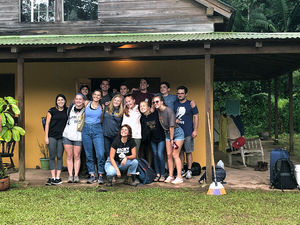 Group photo of Energy Studies Minor students at Casa Pueblo getting ready to head back to San Juan
Group photo of Energy Studies Minor students at Casa Pueblo getting ready to head back to San Juan
The Energy Studies Minor, housed in the College of Engineering at the University of Notre Dame and administered by ND Energy, provides undergraduate students with a holistic understanding of the opportunities and challenges surrounding our rapidly-changing global energy environment. Ethical, political, economic, social, business, and technical considerations are brought together to broaden students’ thinking and to prepare them for future decision-making. This approach to learning is what led to a newly developed course for the minor after Hurricane Maria devastated Puerto Rico’s already fragile energy infrastructure in 2017.
Offered for the first time, 12 students participated in the class “Puerto Rico: Road Map to a Renewable Future.” This course focused on preparing for a weeklong immersion in Puerto Rico during fall break, studying the energy landscape in context of culture and current events. After returning to Notre Dame, participants are required to launch targeted projects to act on what they learned and fulfill the civic engagement component of the experience.
Students began their journey by celebrating a bilingual Mass at the Universidad del Sagrado Corazón and then by hearing the stories of their Puerto Rican counterparts. Sagrado is a Catholic university in San Juan, led by Notre Dame alumnus President Gilberto Marxuach-Torrós (’88). They also took time to appreciate a bit of history and culture by exploring Castillo San Felipe del Morro and Old San Juan. While in the city, they were steeped in discussions with business leaders and politicians about Puerto Rico’s government, history, and current energy infrastructure. This involved meetings with Ricardo Álvarez-Díaz (’96), co-founder and CEO, and Antonio Gárate, senior project architect, of Álvarez-Díaz & Villalón Architecture & Interior Design; Tomás Torres-Placa, Executive Director of the Institute for Competitiveness and Sustainable Economy; former State Senator Ramón-Luis Nieves; and Executive Director Malu Blázquez-Arsuaga and Project Manager Juan González-Moscoso with ReImagina Puerto Rico.
The latter part of the week was spent in the mountain town of Adjuntas, where the award-winning community center, Casa Pueblo, is located. Thanks to solar power, this organization served as an energy oasis after Hurricane Maria and provided life-saving services to the surrounding area. Students met with founder Alexis Massol-González, who overviewed Casa Pueblo’s history from the first rally against open-pit mining to lessons learned in leadership, community building, and resiliency. Students also toured their solar-powered cinema, radio station, and cultural center for music and art; butterfly and hydroponic gardens; the Café Madre Isla coffee operation; and Bosque Escuela la Olimpia, an outdoor classroom in the forest above Adjuntas. In the forest, Casa Pueblo’s Executive Director Arturo Massol-Deyá led the group to the various stations where young people from all over Puerto Rico learn about conservation, watershed protection, ecosystems, hydropower, biodiversity, and the scientific method.
The week concluded with perhaps the most impactful experience, a trip to nearby “El Hoyo” for a service project and the opportunity to visit community members in their homes. Students met with two families that had solar panels installed by Casa Pueblo due to medical needs. They heard firsthand about the life-saving advantages of having reliable energy, the sadness caused by family separations – as many moved away due to lack of opportunities – and the gratitude they had for the group of students who visited them and installed a solar-powered street lamp on a dangerous curve in the road.
Upon returning to Notre Dame, the class is focused on supporting their fellow Americans in Puerto Rico. They understand that action is needed and that the energy future is complicated with many conflicting interests. In spite of the challenges ahead, they were moved by the courage and optimism of those on the island.
“Learning about the energy situation in Puerto Rico is one thing, but experiencing the zeal and hospitality of its people makes me believe that renewable energy for Puerto Rico isn’t just an idea – it’s a realistic goal that we can all work to achieve,” said undergraduate electrical engineer Daniel Mikovits.
For more information about Puerto Rico: Road Map to a Renewable Future, view the complete trip summary and syllabus at the ND Energy website.
The academic advisor of the Energy Studies Minor is Peter C. Burns, The Henry J. Massman Professor of Civil & Environmental Engineering & Earth Sciences, director of a National Nuclear Security Administration’s Actinide Center of Excellence, and director of ND Energy.
Contact:
Anne Berges Pillai
Education and Outreach Associate Program Director
Center for Sustainable Energy at Notre Dame (ND Energy)
University of Notre Dame
apillai@nd.edu / 574-631-9106
energy.nd.edu / @NotreDameEnergy
About ND Energy:
ND Energy is a University Research Center whose mission is to build a better world by creating new energy technologies and systems and educating individuals to help solve the most critical energy challenges facing our world today. For more information, visit energy.nd.edu or contact Barbara Villarosa, Business and Communications Program Director, at bvillaro@nd.edu or 574-631-4776.